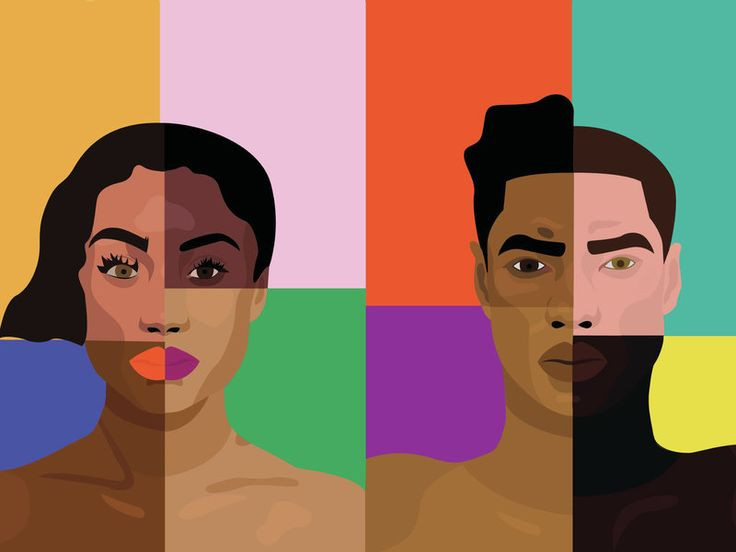Kaalis Combating Colorism

Kaalis Combating Colorism
"Kaali" - one among the many nicknames I have and preferably one of the favorites to call me at home. I absolutely adore the name, but it has not always been like that. I have been called by this name since very young. I had no objections to the name and even loved it as I knew it was given to me with pure adoration being the youngest child. But a phase came when I was growing up, full of insecurities about myself; I despised the darkness of my skin and the name ‘kaali’ was an invocation to remind me of my skin tone. It was up until I came to accept and love my ‘colour’ I now love being called ‘Kaali’.
I am a dark-skinned girl. I grew up being compared to my comparatively fair-skinned siblings, cousins, and friends- in my home, in school, by friends, teachers, relatives, and distance visitors. The old man in my house jokingly used to tell my fair-skinned cousin brother "Kaalo chiya nakhau, milk tea matra khau, natra kaalo hunxa"(that translates to, drink milk tea instead of black tea, black tea will make you dark). There is an unofficial list of sets of colours of clothes I "shouldn't" wear because "that makes me look darker". They said, "You will be pretty when you grow up" because they meant I could enhance my skin tone with whitening cream and powder when I become a grown-up. When I was a teenager, people assumed the reason why I washed my face too many times a day was to have fair skin, but it was just a personal habit of mine. There have been so many similar instances that made me feel my dark skin was less beautiful. I could list such experiences for a whole day, but I am afraid I won't finish.
I never really thought of these things critically as they happened. But reflecting back, in my late teens, when I wasn't really comfortable in my body, these comments and behaviours contributed a lot to strengthening my insecurities. It is not easy to accept yourself in an environment that constantly tells you that what you are and have is not beautiful, not acceptable, not preferable. Dark skin was not preferable. I would hear many conversations among my mom, aunts, their friends, our neighbours and relatives "behula chai kasto kaalo xa, behuli kati goro, suhayena!" (that roughly translates to the groom is so darker than the bride, they don't seem compatible) or "bhati chaa tuise chwa sa gulli balai" (that translates, if a little fairer, would be much more pretty). I had grown numb to these conversations. I never know what to say or feel. But the young brown-skinned me questioned my worth and beauty because of these hints of ‘dark is ugly’ narratives.
I have heard and read of much more severe repercussions so many people have faced just because of their skin colour. Exclusion, discrimination, violence, bullying, being considered unacceptable for marriage, and so many more injustices are faced by people with darker skin; the level of discrimination increases as the more dark-complexioned an individual is. Colourism is implied in different forms and severity in various parts of the world, but it is a universal problem. From whitening creams being overly advertised in South Asia, to whitewashing photos of idols and celebrities in East Asia, to having no makeup products designed or made that serve for dark skin, to colourism manifesting into racism in Europe and America and casteism in South Asia, a simple search in Wikipedia will show you how deeply colourism is rooted all over the world.
The issue of colourism is often ignored or undermined. The severe effects of colourism are sometimes highlighted, and there has been growing attention to the issue. Yet colourism is often manifested through implicit or unconscious bias in such subtle ways that they do not even seem like a problem on the surface. They do not seem like a problem, but they are powerful enough to affect a vast majority of people. I hope for a world where people are aware of their prejudices and biases and treat other humans like humans regardless of their skin colour.
Even though I have grown out of questioning my worth or feeling less beautiful because of my dark skin, I can’t help but worry for the young children who are right now harsh on themselves like I once was. Like Conan Gray’s song “The Story” lyrics say ‘they were just sixteen - when people were mean, so they didn’t love themselves” I am afraid that lots of young people won’t love themselves, won’t accept themselves, and will discriminate against others based on their skin. I wish I could tell them they are beautiful just the way they are- you don’t have to be fairer to be deserving of love and acceptance, and you don’t have to lather your skin with whitening creams as they tell you - you are enough and you are beautiful! And I wish we could create an environment so free of colourism that no child of any skin tone would learn or even know to discriminate against another child with a different skin tone.
And lastly,
To my dear fellow Kaalis, melanin looks good on us; we beam with our dark skin!

